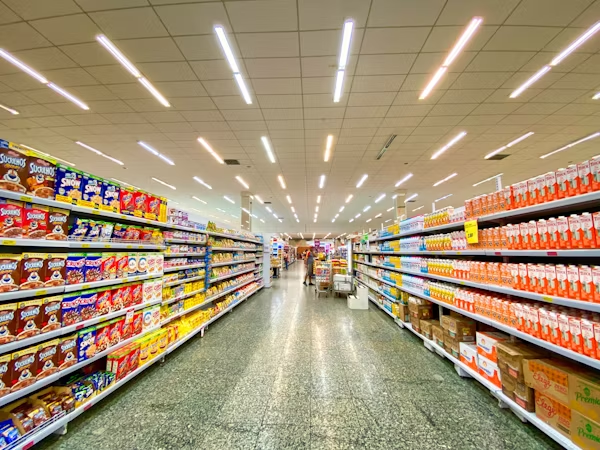Food prices rose again in August, marking the fifth straight month of increases. Official data shows the sharpest pace since early last year.
The cost of food and non-alcoholic drinks climbed 5.1% year on year. Beef, butter, milk and chocolate drove the surge.
Other areas such as air fares slowed, leaving overall inflation steady at 3.8%, the same as in July.
Economists explained that supermarkets are passing higher wage and National Insurance costs directly onto shoppers.
Central bank decision in focus
Inflation remains above the Bank of England’s 2% target. Analysts expect interest rates to stay unchanged at this week’s meeting.
Chancellor Rachel Reeves admitted families feel the strain. She pledged to cut costs and ease pressure on households.
Her first Budget lifted employer National Insurance Contributions and raised the minimum wage. Businesses warned both measures would push up prices.
Reeves promised to avoid more borrowing or new taxes. Yet speculation grows about possible tax rises in November.
Shadow chancellor Sir Mel Stride said price growth is “deeply worrying”. He argued Labour’s policies are fuelling inflation.
Britain outpaces European neighbours
The Office for National Statistics reported food and drink prices up 5.1%, the highest rise in 19 months.
It noted UK inflation is far higher than in Europe. France’s August rate was 0.8%, while Germany reported 2.1%.
KPMG’s chief economist Yael Selfin said Britain had become an “outlier” compared with major economies.
She argued domestic policies, including higher employer National Insurance Contributions, raised business costs passed on to consumers.
Household essentials see sharp rises
Beef and veal prices rose nearly 25% in the year to August. Butter climbed almost 19%, while chocolate rose more than 15%.
The British Retail Consortium warned food inflation is outpacing wage growth, which reached 4.7% between May and July.
Director Kris Hamer said families struggle as pay fails to keep up. However, clothing and footwear prices eased as retailers discounted summer stock.
Staples such as cereals and pasta also fell slightly during the month.
Bank weighs limited options
ING economist James Smith said the 3.8% figure makes it harder for the Bank of England to cut rates further this year.
He warned food inflation could rise again by year-end. The Bank has already cut rates five times since August last year, lowering borrowing costs to 4%.
Officials expect inflation to peak at 4% in September. Markets widely predict no rate change this week.
Capital Economics doubts a cut will follow in November. But its economist Paul Dales expects weaker wage growth to push inflation closer to US and eurozone levels.
He forecast rates will fall from 4% to 3% by the end of next year.
Small firms bear the burden
Tom Egan, who runs Coosh Bakery in Nottingham with his wife, said butter and chocolate prices have doubled supplier costs.
Poor cocoa harvests in Ghana and other regions drove prices up. He said a 10kg batch once priced at £60 now costs more than £150.
Butter has climbed 50% in a year as milk imports dropped. Reduced supply has sharply raised costs.
Egan added the rise in National Insurance Contributions has also “stung”. His bakery now delays investing in new equipment and technology to boost productivity.


